David Dailey was an itinerant preacher with the Methodist Church in the early 19th century, and he kept diaries of his travels on various “circuits” on the Delaware/Maryland/Virginia peninsula, which at the time was part of the Philadelphia Conference. These diaries have been preserved by St. George’s United Methodist Church and have been digitized as part of this project:
- Diary of preacher David Dailey, 1813-1814
- Diary of preacher David Dailey, 1814-1815
- Diary of preacher David Dailey, 1815-1816
- Diary of preacher David Dailey, 1816-1817
- Diary of preacher David Dailey, 1817
- Diary of preacher David Dailey, 1819-1820
Special thanks to Matthew Barger for transcribing these diaries, rendering them full-text searchable.
As with all colonial churches, the United Methodist Church has had a complicated relationship with race. Although its founding father, John Wesley, was vocal in his support of the abolition of slavery, racial segregation was official church policy until 1968.
Accordingly, Dailey routinely met with black classes separately from white classes during his travels, and a search on the transcribed text of these diaries using the terms “black,” “negro” and “coloured” turns up over 100 entries over the course of these eight years.
Dailey’s experiences on the road were often quite emotionally challenging, particularly early on, when he was often lonely and plagued with hoarseness. He recorded some of his difficulties with the black classes in his first diary:
Image 31, Friday August 20, 1813
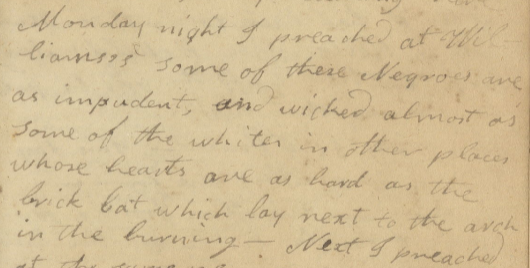
Monday night I preached at Williams’s some of these Negroes are as impudent, and wicked almost as some of the whites in other places whose hearts are as hard as the brick bat which lay next to the arch in the burning-.
Image 41, Thursday September 30, 1813
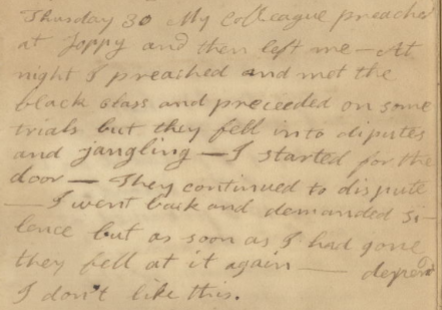
My colleague preached at [Joppy?] and then left me–At night I preached and met the black class and preceeded on some trials but they fell into disputes and jangling–I started for the door–They continued to dispute –I went back and demanded silence but as soon as I had gone they fell at it again–depress’d I don’t like this.
However, his experiences improve (with both black and white classes) in later diaries, where he wrote:
Sunday April 24, 1814
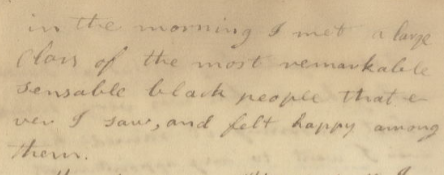
in the morning I met a large class of the most remarkable sensable black people that ever I saw, and felt happy among them.
Thursday, June 6, 1816
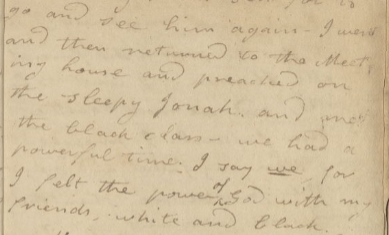
…after noon I went to brother Maddux’s–in the evening I was sent for to go and see him again–I went and then returned to the Meeting house and preached on the sleepy Jonah and met the black class–we had a powerful time. I say we for I felt the power of God with my friends, white and black.
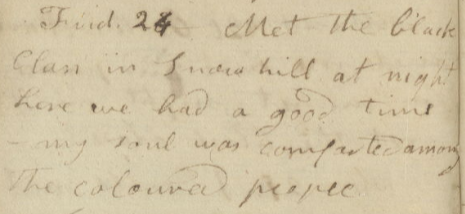
Met the black class in Snow hill at night here we had a good time –my soul was comforted among the coloured people.
There are far too many relevant entries to reproduce in one blog post, however, I have selected a few that might be of interest.
On Wednesday March 1, 1815 Dailey wrote:
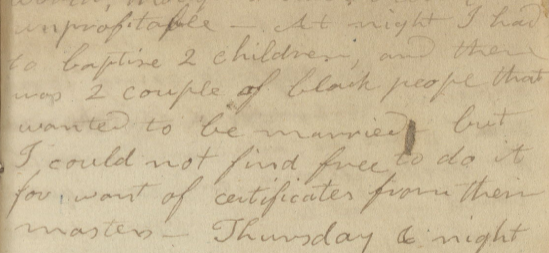
At night I had to baptise 2 children, and there was 2 couple of black people that wanted to be married–but I could not find free to do it for want of certificates from their masters.
Contrast this with Dailey’s entry from Saturday, January 8, 1820:
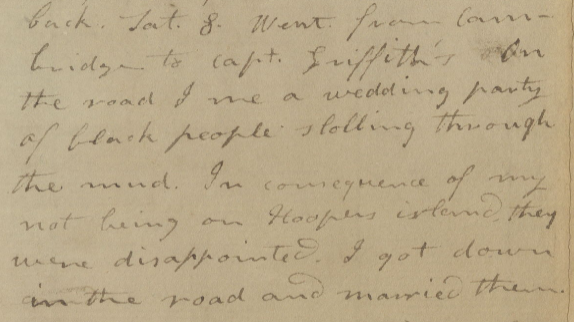
Went from Cambridge to capt. Griffith’s On the road I met a wedding party of black people slolling through the mud. In consequence of my not being on Hoopers island, they were disappointed. I got down in the road and married them.
Did the second group of betrothed carry some sort of proof of their freedom, or had Dailey come to regard the sacrament of marriage as one that should be granted freely regardless?
Other entries detail Dailey’s duties as a kind of judge, duties that he took seriously regardless of race.
Sunday, February 25, 1816
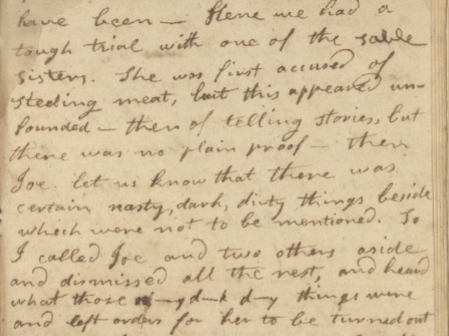
Here we had a tough trial with one of the sable sisters. She was first accused of steeling meat, but this appeared unfounded –then of telling stories, but there was no plain proof–then Joe let us know that there was certain nasty, dark, dirty things beside which were not to be mentioned. So I called Joe and two others aside and dismissed all the rest, and heard what those n-y d-k d-y things were and left orders for her to be turned out.
Dailey applied the same standards to the case of a black man three years later, in entries from Friday December 17, 1819 to Tuesday December 21, 1819
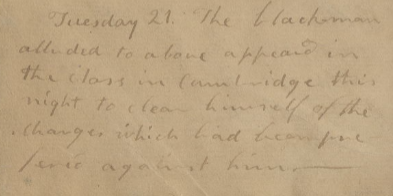
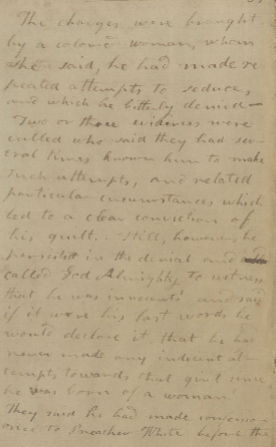
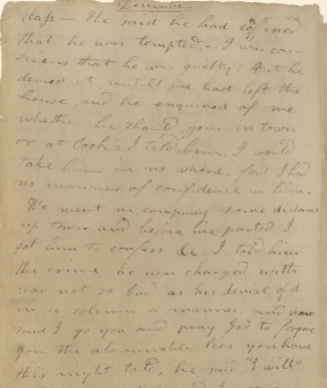
Tuesday 21. The black-man alluded to above appeared in the class in Cambridge this night to clear himself of the charges which had been [pre?ered] against him—- The charges were brought by a coloured woman, whom she said, he had made repeated attempts to seduce, and which he bitterly denied– Two or three evidences were called who said they had several times known him to make such attempts, and related particular circumstances which led to a clear conviction of his guilt…still, however, he persisted in the denial and called called God Almighty to witness that he was innocent! and said if it were his last word, he would declare it, that he had never made any indecent attempts towards that girl since he was born of a woman! They said he had made confession once to Preacher White before the class–He said he had confessed that he was tempted.–I was conscieus that he was guilty: But he denied it untill we had left the house, and he enquired of me whether he should join in town or at Cook’s I told him I would take him in no where, for I had no manner of confidence in him. We went in company some distance up town, and before we parted I got him to confess etc. I told him the crime he was charged with was not so bad as his denial of it in so solemn a manner. and now said I go you and pray God to forgive you the abominable lies you have this night told, he said “I will”
Three entries from the 1817 diaries also concern justice – or rather, racial injustice.
Tuesday May 13, 1817
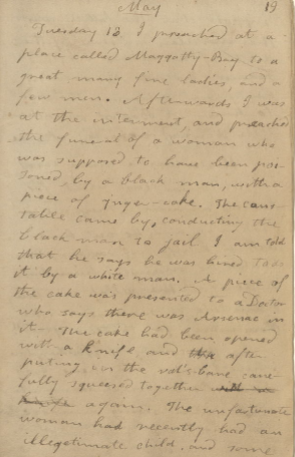
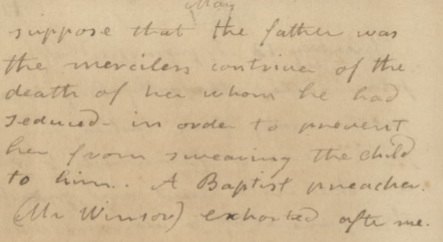
I preached at a place called Maggothy-Bay to a great many fine ladies, and a few men. Afterwards I was at the interment, and preached the funeral of a woman who was supposed to have been poisoned, by a black man, with a piece of ginger-cake. The canstable came by, conducting the black man to jail. I am told that he says he was hired to do it by a white man. A piece of the cake was presented to a Doctor who says there was Arsenac in it–The cake had been opened with a knife, and the after puting in the rat’s-bane carefully squeezed together with [?] knife again. The unfartunate woman had recently had an illegitimate child, and some suppose that the father was the merciless contriver of the death of her whom he had seduced–in order to prevent her from swearing the child to him.
Tuesday May 13/Wednesday May 14, 1817
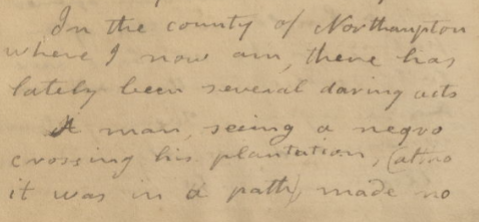
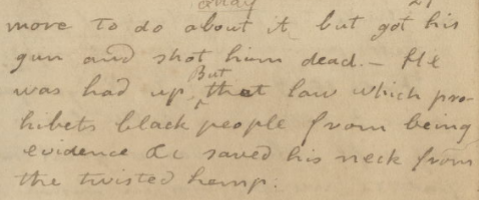
In the county of Northampton where I now am, there has lately been several daring acts A man, seeing a negro crossing his plantation, (altho it was in a path), made no more to do about it but got his gun and shot him dead.– He was had up But that law which prohibets black people from being evidence &c saved his neck from the twisted hemp.
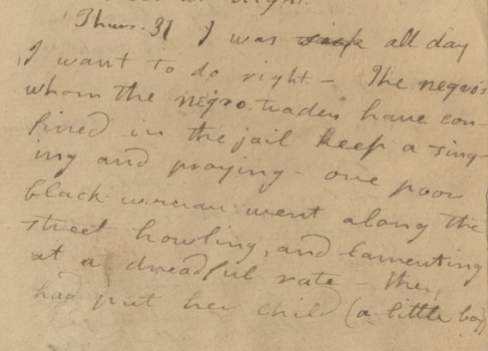

Thurs. 31 I was sick all day I want to do right.–The negro’s whom the negro traders have confined in the jail keep a-singing and praying–one poor black woman went along the street howling, and lamenting at a dreadful rate–then had put her child (a little boy) in jail to keep till they could send him to the south.
St. George’s has a list of all the relevant entries concerning black classes on Dailey’s various circuits – it might be interesting in the future for a researcher to map out the places on the Delmarva peninsula in which black classes regularly met.